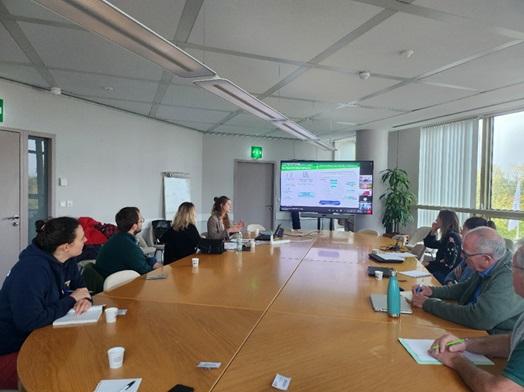Tailored Solutions for RECs by Collaboration and Innovation
On November 6, 2024, the Nouvelle-Aquitaine Region and ALEC gathered local stakeholders for an exchange as part of the European Interreg Europe REC4EU project. This meeting marked the second gathering of the group facilitated by ALEC. The collaboration aims to connect projects, initiatives, and territorial needs (tools, development, and resource sharing) related to energy communities, with the goal of strengthening public policies.
Tailored Solutions for Energy Communities in Nouvelle-Aquitaine Driven by Collaboration and Innovation
On November 6, 2024, the Nouvelle-Aquitaine Region and ALEC brought together local stakeholders for an exchange as part of the European Interreg Europe REC4EU project. This marked the second meeting of the group facilitated by ALEC. This collaboration connects local projects, initiatives, and needs (tools, development, pooling of resources) related to energy communities, aiming to strengthen public policies.
Addressing Disparities in the Development of RECs
One key observation from this meeting was the disparity in the development of energy communities across Europe. In Nouvelle-Aquitaine, while the region boasts significant potential for renewable energy production and various support mechanisms, the number of projects led by citizens and local authorities remains relatively low compared to other French and European regions where such initiatives are more numerous.
The objective of these meetings is to identify areas for improvement and potential public policy changes that could better support the creation and operation of energy communities.
Ongoing Initiatives to Strengthen Public Policies in Nouvelle-Aquitaine
In addition to the two European projects in which ALEC participates and the various regional support schemes, feedback from three ongoing initiatives was presented:
1. CERNA Project:
At the European level, several countries have already implemented highly developed models for energy communities. These countries are characterized by greater regulatory flexibility and strong collaboration among local actors, public authorities, and citizens. The CERNA project, presented by the University of Pau, draws on these experiences to identify best practices that can be adapted to Nouvelle-Aquitaine while considering the specific needs of each local territory.
2. ENERKIDE Project:
ENERKIDE aims to "encourage the creation of RECs based on local resources, with more diverse energy sources and project objectives, while promoting new communities and cross-border projects." The project is developing a toolkit that will complement those created under the Horizon Europe Masterpiece project, in which ALEC is also a partner.
3. EKINDAR Initiative:
Based in the Basque Country, EKINDAR is a cooperative society of collective interest (SCIC) committed to developing renewable energy. The organization is leading an ambitious project to implement several local collective self-consumption operations as part of a broader territorial approach to energy efficiency. Launched in 2021, EKINDAR highlights both the opportunities and challenges encountered in such projects.
This collaborative dynamic underscores the importance of pooling best practices and supporting project leaders to advance energy communities in Nouvelle-Aquitaine.
Collaborative Efforts Led by ALEC
ALEC convened participants for this exchange group, including organizations such as ADEME Nouvelle-Aquitaine, Enercoop Nouvelle-Aquitaine, the Gironde Departmental Council, Sybarval, SCIC EKINDAR, Les Lucioles, the Caisse des Dépôts, ESTIA, the University of Pau and Adour, and Kedge Business School.
One of the primary focuses of this meeting was the importance of supporting project leaders throughout their development process. This support requires close collaboration among public, private, and institutional stakeholders. The success of these projects depends on the active involvement of all these actors.
While challenges persist, particularly in terms of funding, governance, and regulation, there are also significant levers for progress: enhancing skills, sharing experiences and best practices, and fostering collaborative support for projects.
ALEC’s Role in Gironde
ALEC continues to play a central role by providing concrete and operational support to regional stakeholders. As a partner in the Interreg Europe REC4EU project, ALEC contributes to analyzing the region's needs to assist Nouvelle-Aquitaine in strengthening its public policies.
About REC4EU
REC4EU is a territorial cooperation project aimed at supporting the development of RECs across Europe. Its objectives include enhancing existing regional support mechanisms, improving governance frameworks for public administrations, and involving local and regional stakeholders. The project addresses both advanced regions, where energy communities are already well established, and less developed regions that are just beginning to implement coordination and support tools.

